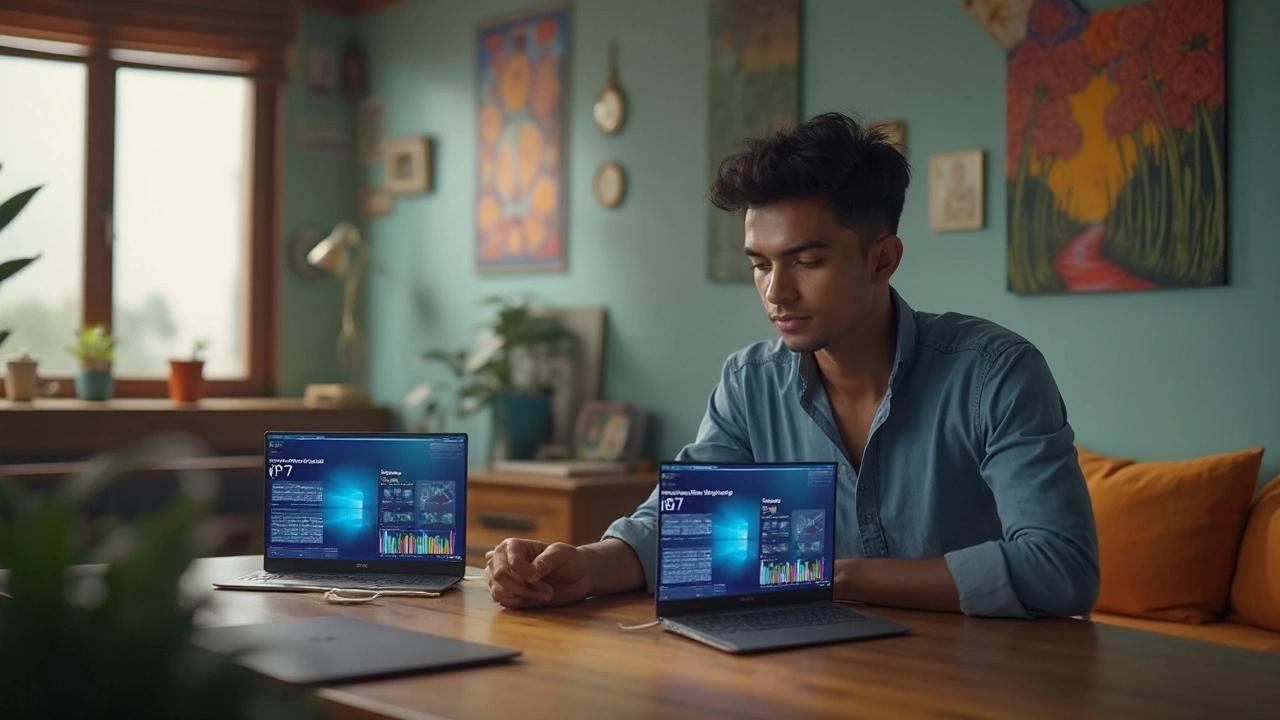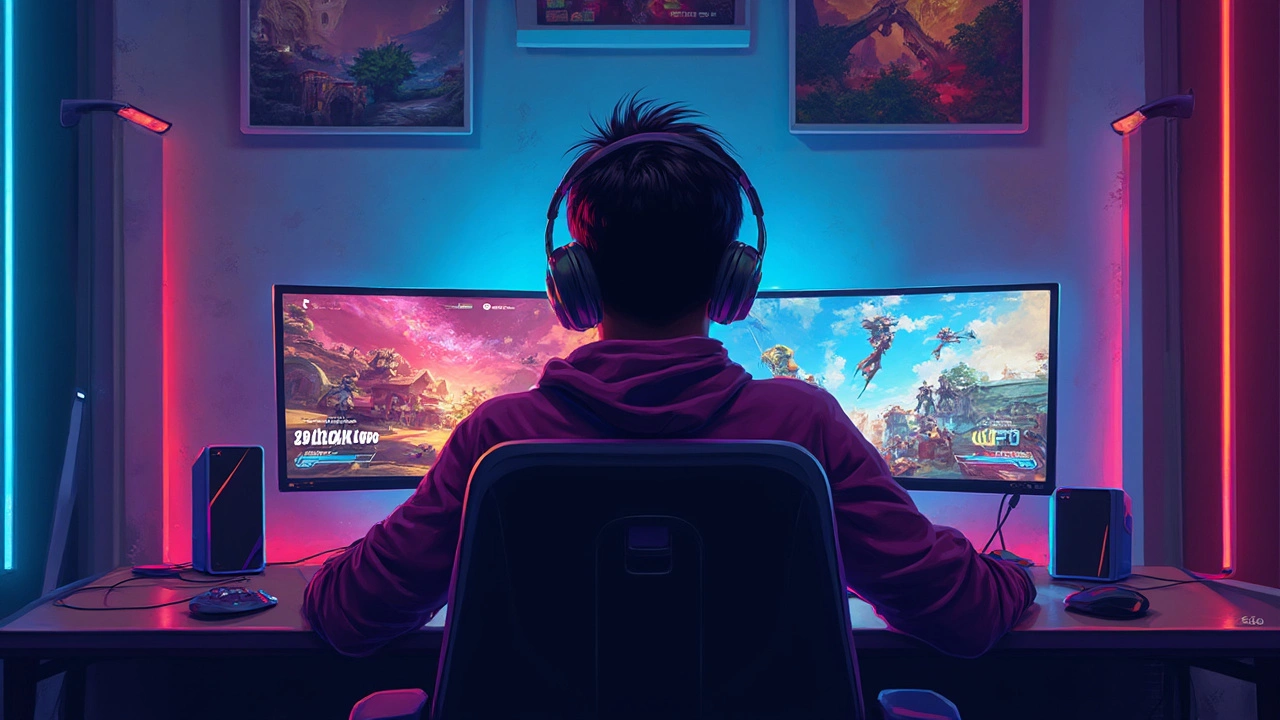
Heard a salesperson pitch an i9 laptop like it's a spaceship, and suddenly your i7 starts feeling like a rusty bike? Hold on. Before you cough up hundreds more for those extra specs, it helps to know what you’re actually getting—and what you could skip if you want to keep some cash in your pocket.
Both i9 and i7 processors look pretty slick in ads, but real-life use is a whole different story. Maybe you’re editing family videos, gaming after the kids are asleep, or just toggling between emails and Netflix. Not everyone needs a powerhouse. In fact, my i7-powered laptop still crushes it for work, editing, and the wild number of Chrome tabs my kids open for homework.
But yes, there’s a reason i9s are out there, and sometimes, they do make sense. So the big question: Are you going to notice that difference, or just hand over extra cash for features you’ll never push to the limit?
- What Makes i7 and i9 Different Anyway?
- Does Performance Really Change Your Day?
- Gaming, Work, and Battery Life: What Matters Most
- Tips Before You Hand Over Cash
What Makes i7 and i9 Different Anyway?
The first thing everyone wants to know: what actually separates an i7 from an i9? In simple terms, it's all about performance headroom. An i9 usually has more cores and threads compared to an i7. This means it can juggle more things at once, and it’s built to handle heavier stuff like video rendering or high-end gaming. Here’s a typical comparison for recent laptop chips (think 13th or 14th gen from Intel):
| Feature | i7 (typical) | i9 (typical) |
|---|---|---|
| Cores/Threads | 8/16 | 14/20+ |
| Clock Speed (Turbo) | 4.8 GHz | 5.4 GHz+ |
| Cache | 24 MB | 36 MB |
| Power Use | Lower | Higher |
The i9 also gets you higher boost clocks and a bigger cache. Sounds fancy, but unless you’re doing things like running massive spreadsheets, streaming while gaming, or crunching lots of data, a top-end i7 will already blow through most day-to-day jobs without sweat.
Here’s the catch: to really feel all that extra power, your laptop needs good cooling. An i9 can run hotter, and if your machine is thin and light, it may not keep up with the heat. That means your pricey processor could end up performing just like an i7 anyway because it’ll have to slow down to stay cool.
So, when comparing i7 vs i9 for best laptops, the short version is this—i9 laptops have the most horsepower, but there are trade-offs in heat, battery drain, and price.
Does Performance Really Change Your Day?
The jump from an Intel i7 to an i9 sounds huge. You might picture lightning-fast boot times and instant app launches. But here’s where marketing and real-world use split. If your day is all web browsing, emails, school docs for the kids, and the occasional Netflix binge, a modern i7 barely breaks a sweat. Most folks never notice the split-second speed gains you get from an i9 in those situations.
Where the i9 shines is in heavy-duty stuff—think rendering 4K videos, big 3D modeling projects, or running several virtual machines at once. For gaming, you’ll only see big jumps if a high-end graphics card is also in the mix. And usually, it’s the graphics card, not the processor, that holds things back first.
Check out this real-world example (based on 2024 benchmarks):
| Task | i7 (12th Gen) | i9 (13th Gen) |
|---|---|---|
| Boot Time | 13 seconds | 11 seconds |
| 4K Video Export (10 min clip) | 8 mins 45 sec | 6 mins 50 sec |
| Open 30 Chrome Tabs | No lag | No lag |
| Battery Life (average use) | 8.5 hours | 7.5 hours |
If you regularly edit video, those minutes add up and the i9 could save your sanity. But if you use your laptop more like my daughter Annelise does for school and streaming shows, the difference blurs fast. Even my son Soren, who games a lot, only saw little FPS boosts in Minecraft after upgrading from i7 to i9, because the real limit was his graphics card, not his processor.
The hidden catch? The extra performance of an i9 usually means shorter battery life and a hotter laptop. Some models even ramp up the fan noise more often because they're managing more heat. So, yeah, more power comes with some trade-offs.

Gaming, Work, and Battery Life: What Matters Most
If you’re trying to pick between i9 vs i7 for your next laptop, think about what you’re mainly going to do. Gaming, work tasks, and battery life hit different with each chip, and there are trade-offs worth knowing before you buy.
If you game a lot, the processor matters, but not as much as people assume. For 90% of games, an i7 paired with a strong GPU (graphics card) will give you buttery-smooth performance. Only the most demanding titles—or chasing insanely high frame rates on a pricey 4K screen—push the i9 ahead. Here’s some perspective: Most recent i7s can handle big games like Baldur’s Gate 3 or Cyberpunk 2077 without breaking a sweat. Unless you’re also streaming, recording, and running Discord all at once, the extra muscle of an i9 is overkill for most gamers.
On the work side, the story shifts a bit. If you’re into heavy video editing, compiling software, or working with huge spreadsheets, the extra cores and higher clock speeds of an i9 can save you precious minutes—think exporting a long video for your YouTube channel or running virtual machines for coding. For casual use—emails, web browsing, photo sorting—the difference barely shows up.
Now, here’s the kicker that never makes it into the ads—battery life. i9 laptops usually burn through their batteries quicker than i7 models. Those extra cores draw more power, and you’ll notice it if you’re away from your charger. Say you’re using your laptop for school reports at the kitchen table or taking it on a picnic with the kids—an i7 chip is much less likely to leave you hunting for an outlet.
Here’s a quick look at the battery and performance differences from a few popular laptops tested last fall:
| Processor | Average Gaming FPS | 8-Hour Battery Test (Web Browsing) |
|---|---|---|
| i7-13700H | 115 | 7 hours |
| i9-13900HK | 124 | 5.5 hours |
The i9 squeaks out a higher frame rate, but sheds battery more than an hour quicker. Ask yourself: Is a 5-8% gaming boost worth less unplugged time?
- Gamers: Prioritize the GPU and decent cooling. i7 is fine for most.
- Work warriors: If video editing or 3D rendering is your thing, the i9 helps. Otherwise, save the money.
- Road warriors: i7 gives you more freedom away from the wall outlet.
Think about the stuff you actually do all week before falling for bigger numbers. A well-matched laptop keeps up with your life—not just your wishlist.
Tips Before You Hand Over Cash
Let’s be honest—buying a laptop with an i9 vs i7 chip can feel like ordering at a restaurant where every upgrade costs way more than the last. So, how do you know which menu item fits your hunger (and your wallet)?
- Know Your Real Use: If your day is emails, web browsing, Office stuff, and the occasional Netflix binge, an i7 will breeze through it. Save your money unless you plan on serious video editing, 3D rendering, or heavy gaming.
- Look At Core Count and Clocks: A laptop i9 usually has more cores and higher base/turbo clock speeds than an i7, so it does help with multitasking and pro-level creative work. But these chips use more power, which means more heat and less battery when you’re unplugged.
- Laptop Cooling Matters: High-powered CPUs like the i9 can run hot, especially in thin laptops. If the laptop doesn’t have good cooling, you won’t get all that advertised speed. Always check real user reviews or YouTube stress tests to see if it throttles under load.
- Don’t Ignore RAM and SSD: The processor’s not the whole story. If you get an i9 but only 8GB RAM, you’ll bottleneck fast. Always pair strong CPUs with at least 16GB RAM and a fast SSD—it makes a bigger difference than you’d think for day-to-day speed.
- Check Your Software: A lot of programs—like Photoshop, Premiere, or high-end games—actually list optimal specs. Check those before spending, because most won’t max out what a laptop i9 can do.
- Battery Life vs. Raw Power: Planning to travel or use your laptop all day at school or work? i7 laptops almost always run cooler and last longer per charge than their i9 cousins.
Here’s a quick look at the battery difference (numbers are typical, but check always real reviews for your exact laptop model):
| Chip | Average Laptop Battery Life |
|---|---|
| i7 (13th Gen) | 8-12 hours basic use |
| i9 (13th Gen) | 4-7 hours basic use |
If you’re eyeing a laptop for school, everyday use, or want max battery, the i7 makes more sense. But if you’re a pro video creator, heavy multitasker, or you just want bragging rights on the fastest machine, go ahead—just understand what you’re actually paying for before you click buy.